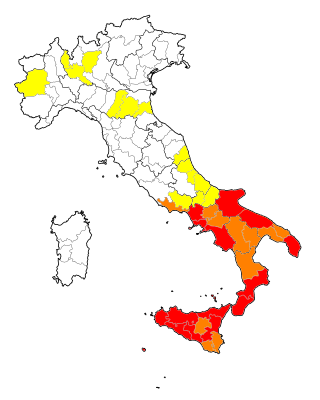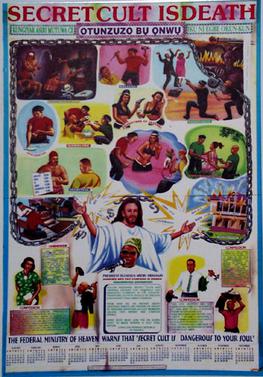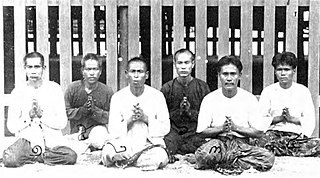
Nigeria is the most populous country in Africa and the sixth in the world. It is also one of the most densely populated countries in Africa, with approximately 218.5 million people in an area of 923,768 km2 (356,669 sq mi).

An advance-fee scam is a form of fraud and is one of the most common types of confidence tricks. The scam typically involves promising the victim a significant share of a large sum of money, in return for a small up-front payment, which the fraudster claims will be used to obtain the large sum. If a victim makes the payment, the fraudster either invents a series of further fees for the victim to pay or simply disappears.
The Black Mafia, also known as the Philadelphia Black Mafia (PBM), Black Muslim Mafia and Muslim Mob, was a Philadelphia-based African-American organized crime syndicate. The organization began in the 1960s as a relatively small criminal collective in South Philadelphia, known for holding up neighborhood crap games and dealing in the illegal drug business, but at its height of operation in the early 1970s until about the early 1980s, it managed to consolidate power and control a large portion of criminal activity in various African-American neighborhoods throughout Philadelphia and the Delaware Valley, including South Jersey, Chester, and Wilmington. In addition to drug trafficking, burglary, and armed robbery, the Black Mafia was also engaged in traditional organized crime activities such as political corruption, extortion, racketeering, prostitution, loansharking, number running, and other illegal gambling rackets.
Chief Lucky Nosakhare Igbinedion is a Nigerian politician who served as the governor of Edo State from 1999 to 2007. He is a member of the Peoples Democratic Party (PDP).

Criminal organizations have been prevalent in Italy, especially in the southern part of the country, for centuries and have affected the social and economic life of many Italian regions. There are major native mafia-like organizations that are heavily active in Italy. The most powerful of these organizations are the 'Ndrangheta from Calabria, the Cosa Nostra from Sicily, and the Camorra from Campania.
Ogboni is a fraternal institution indigenous to the Yoruba-speaking polities of Nigeria, Republic of Bénin and Togo, as well as among the Edo people. The society performs a range of political and religious functions, including exercising a profound influence on monarchs and serving as high courts of jurisprudence in capital offenses.
Organised crime in Nigeria includes activities by fraudsters, bandits, drug traffickers and racketeers, which have spread across Western Africa. Nigerian criminal gangs rose to prominence in the 1980s, owing much to the globalisation of the world's economies and the high level of lawlessness and corruption in the country.

Confraternities in Nigeria are secretive student groups within Nigerian higher education that have been involved in violence and organized crime since the 1980s. The exact death toll of confraternity activities is unclear. One estimate in 2002 was that 250 people had been killed in campus cult-related murders in the previous decade, while the Exam Ethics Project lobby group estimated that 115 students and teachers had been killed between 1993 and 2019.
Efforts to crack down on human trafficking in Russia focus not only on the men, women, and children who are illegally shipped out of Russia to undergo forced labor and sexual exploitation in other countries, but also those who are illegally brought into Russia from abroad. The Government of the Russian Federation has made significant progress in this area over the past decade, but a report commissioned by the United States Department of State in 2010 concluded that much more needed to be done before Russia could be taken off its Tier 3 watchlist. U.S. State Department's Office to Monitor and Combat Trafficking in Persons placed the country in "Tier 3" in 2017.
The Obafemi Awolowo University massacre was a mass murder of students of Obafemi Awolowo University in Ile-Ife, Osun State, Nigeria on 10 July 1999. Five students of OAU were killed and eleven injured.
Laukkai is the capital of Kokang Self-Administered Zone in the northern part of Shan State, Myanmar. It is located east of the Salween River, which forms part of Myanmar's border with the People's Republic of China at its upper reaches. It is about 10 miles (16 km) away from Nansan, China. In Laukkai, Southwestern Mandarin and Chinese characters are widely used, and the Chinese renminbi is in circulation. It is the main town of Laukkaing Township of the Kokang Self-Administered Zone. It is 117 miles (188 km) from Lashio and 42 miles (68 km) from Kongyan. Its population is 23,435. Laukkai is notorious for its gambling, prostitution, human trafficking and online scams.
Benin is a country of origin and transit for children subjected to trafficking in persons, specifically conditions of forced labor and forced prostitution. Until recently, analysts also considered Benin a destination country for foreign children brought to the country and subjected to forced labor, but new information from government and non-government sources indicates the total number of such children is not significant. The majority of victims are girls trafficked into domestic servitude or the commercial sex trade in Cotonou, the administrative capital. Some boys are forced to labor on farms, work in construction, produce handicrafts, or hawk items on the street. Many traffickers are relatives or acquaintances of their victims, exploiting the traditional system of vidomegon, in which parents allow their children to live with and work for richer relatives, usually in urban areas. There are reports that some tourists visiting Pendjari National Park in northern Benin exploit underage girls in prostitution, some of whom may be trafficking victims. Beninese children recruited for forced labor exploitation abroad are destined largely for Nigeria and Gabon, with some also going to Ivory Coast and other African countries, where they may be forced to work in mines, quarries, or the cocoa sector.
Niger is a source, transit, and destination country for children and women subjected to trafficking in persons, specifically forced labor and forced prostitution. Caste-based slavery practices, rooted in ancestral master-slave relationships, continue primarily in the northern part of the country. Children are trafficked within Niger for forced begging by religious instructors known as marabouts; forced labor in gold mines, agriculture, and stone quarries; as well as for involuntary domestic servitude and forced prostitution. The ILO estimates at least 10,000 children work in gold mines in Niger, many of whom may be forced to work. Nigerien children, primarily girls, are also subjected to commercial sexual exploitation along the border with Nigeria, particularly in the towns of Birni N'Konni and Zinder along the main highway, and boys are trafficked to Nigeria and Mali for forced begging and manual labor. There were reports Nigerien girls entered into "false marriages" with citizens of Nigeria, Saudi Arabia, and the United Arab Emirates: upon arrival in these countries, the girls are often forced into involuntary domestic servitude. Child marriage was a problem, especially in rural areas, and may have contributed to conditions of human trafficking. Niger is a transit country for women and children from Benin, Burkina Faso, Gabon, Ghana, Mali, Nigeria, and Togo en route to Northern Africa and Western Europe; some may be subjected to forced labor in Niger as domestic servants, forced laborers in mines and on farms, and as mechanics and welders. To a lesser extent, Nigerien women and children are sometimes trafficked from Niger to North Africa the Middle East, and Europe for involuntary domestic servitude and forced commercial sexual exploitation."
Prostitution in Niger is illegal but common in the cities, near mines and around military bases. UNAIDS estimate there are 46,630 sex workers in the country. Many have turned to prostitution because of poverty.
The Armenian mafia is a general term for organized criminal gangs that consist of ethnic Armenians. In Armenia, the structure is organized in clans called yekhpayrutyuns.

A triad is a Chinese transnational organized crime syndicate based in Greater China with outposts in various countries having significant overseas Chinese populations.

Slavery has existed in various forms throughout the history of Nigeria, notably during the Atlantic slave trade and Trans-Saharan trade. Slavery is now illegal internationally and in Nigeria. However, legality is often overlooked with different pre-existing cultural traditions, which view certain actions differently. In Nigeria, certain traditions and religious practices have led to "the inevitable overlap between cultural, traditional, and religious practices as well as national legislation in many African states" which has had the power to exert extra-legal control over many lives resulting in modern-day slavery. The most common forms of modern slavery in Nigeria are human trafficking and child labor. Because modern slavery is difficult to recognize, it has been difficult to combat this practice despite international and national efforts.






